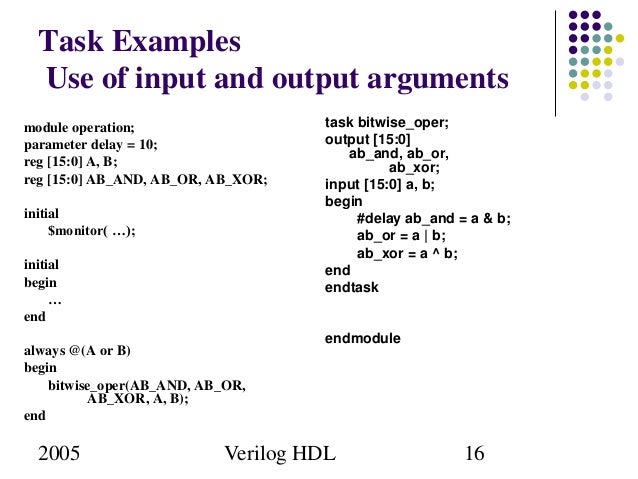
Introduction
There are tasks and functions that are used to generate input and output during simulation. Their names begin with a dollar sign ($). The synthesis tools parse and ignore system functions, and hence can be included even in synthesizable models.
| $display, $strobe, $monitor |
| These commands have the same syntax, and display text on the screen during simulation. They are much less convenient than waveform display tools like GTKWave. or Undertow or Debussy. $display and $strobe display once every time they are executed, whereas $monitor displays every time one of its parameters changes. The difference between $display and $strobe is that $strobe displays the parameters at the very end of the current simulation time unit rather than exactly when it is executed. The format string is like that in C/C++, and may contain format characters. Format characters include %d (decimal), %h (hexadecimal), %b (binary), %c (character), %s (string) and %t (time), %m (hierarchy level). %5d, %5b etc. would give exactly 5 spaces for the number instead of the space needed. Append b, h, o to the task name to change default format to binary, octal or hexadecimal. |
Syntax
- $display ("format_string", par_1, par_2, ... );
- $strobe ("format_string", par_1, par_2, ... );
- $monitor ("format_string", par_1, par_2, ... );
- $displayb (as above but defaults to binary..);
- $strobeh (as above but defaults to hex..);
- $monitoro (as above but defaults to octal..);
| $time, $stime, $realtime |
| These return the current simulation time as a 64-bit integer, a 32-bit integer, and a real number, respectively. |
| $reset, $stop, $finish |
| $reset resets the simulation back to time 0; $stop halts the simulator and puts it in interactive mode where the user can enter commands; $finish exits the simulator back to the operating system. |
| $scope, $showscope |
| $scope(hierarchy_name) sets the current hierarchical scope to hierarchy_name. $showscopes(n) lists all modules, tasks and block names in (and below, if n is set to 1) the current scope. |
| $random |
| $random generates a random integer every time it is called. If the sequence is to be repeatable, the first time one invokes random giving it a numerical argument (a seed). Otherwise the seed is derived from the computer clock. |
| $dumpfile, $dumpvar, $dumpon, $dumpoff, $dumpall |
| Â |
| These can dump variable changes to a simulation viewer like Debussy. The dump files are capable of dumping all the variables in a simulation. This is convenient for debugging, but can be very slow. |
Syntax
- $dumpfile("filename.vcd")
- $dumpvar dumps all variables in the design.
- $dumpvar(1, top) dumps all the variables in module top and below, but not modules instantiated in top.
- $dumpvar(2, top) dumps all the variables in module top and 1 level below.
- $dumpvar(n, top) dumps all the variables in module top and n-1 levels below.
- $dumpvar(0, top) dumps all the variables in module top and all level below.
- $dumpon initiates the dump.
- $dumpoff stop dumping.
| $fopen, $fdisplay, $fstrobe $fmonitor and $fwrite |
| These commands write more selectively to files. |
| Â |
- $fopen opens an output file and gives the open file a handle for use by the other commands.
- $fclose closes the file and lets other programs access it.
- $fdisplay and $fwrite write formatted data to a file whenever they are executed. They are the same except $fdisplay inserts a new line after every execution and $write does not.
- $strobe also writes to a file when executed, but it waits until all other operations in the time step are complete before writing. Thus initial #1 a=1; b=0; $fstrobe(hand1, a,b); b=1; will write write 1 1 for a and b.
- $monitor writes to a file whenever any of its arguments changes.
Syntax
- handle1=$fopen("filenam1.suffix")
- handle2=$fopen("filenam2.suffix")
- $fstrobe(handle1, format, variable list) //strobe data into filenam1.suffix
- $fdisplay(handle2, format, variable list) //write data into filenam2.suffix
- $fwrite(handle2, format, variable list) //write data into filenam2.suffix all on one line. Put in the format string where a new line is desired.
Bạn Có Đam Mê Với Vi Mạch hay Nhúng - Bạn Muốn Trau Dồi Thêm Kĩ Năng
Mong Muốn Có Thêm Cơ Hội Trong Công Việc
Và Trở Thành Một Người Có Giá Trị Hơn
